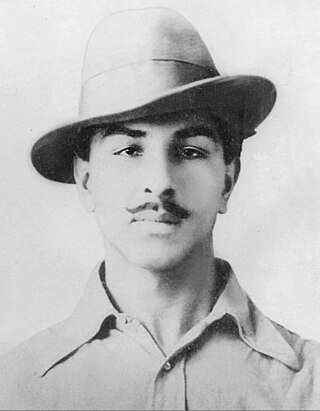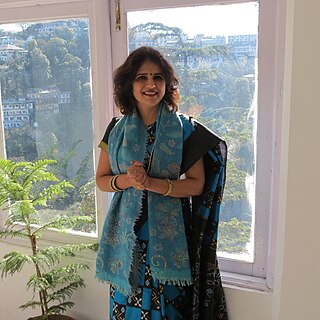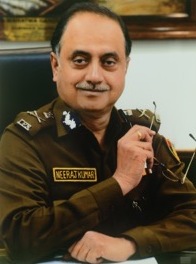
Sanjay Gandhi was an Indian politician and the younger son of Indira Gandhi and Feroze Gandhi. He was a member of parliament, Lok Sabha and the Nehru–Gandhi family.

Bhagat Singh was an Indian anti-colonial revolutionary, who participated in the mistaken murder of a junior British police officer in December 1928 in what was to be retaliation for the death of an Indian nationalist. He later took part in a largely symbolic bombing of the Central Legislative Assembly in Delhi and a hunger strike in jail, which—on the back of sympathetic coverage in Indian-owned newspapers—turned him into a household name in the Punjab region, and after his execution at age 23 into a martyr and folk hero in Northern India. Borrowing ideas from Bolshevism and anarchism, the charismatic Singh electrified a growing militancy in India in the 1930s, and prompted urgent introspection within the Indian National Congress's nonviolent but eventually successful campaign for India's independence.

The Cellular Jail, also known as 'Kālā Pānī', was a British colonial prison in the Andaman and Nicobar Islands. The prison was used by the colonial government of India for the purpose of exiling criminals and political prisoners. Many notable independence activists, including Sardar Singh Artillery, Diwan Singh Kalepani, Yogendra Shukla, Batukeshwar Dutt, Shadan Chandra Chatterjee, Sohan Singh, Vinayak Savarkar, Hare Krishna Konar, Shiv Verma, Allama Fazl-e-Haq Khairabadi, and Sudhanshu Dasgupta were imprisoned here during the struggle for India's independence. Today, the complex serves as a national memorial monument.

Satya Narayana Goenka was an Indian teacher of vipassanā meditation. Born in Burma to an Indian business family, he moved to India in 1969 and started teaching meditation. His teaching emphasized that the Buddha's path to liberation was non-sectarian, universal, and scientific in character. He became an influential teacher and played an important role in establishing non-commercial Vipassana meditation centers globally. He was awarded the Padma Bhushan by the Government of India in 2012, an award given for distinguished service of high order.

The Emergency in India was a 21-month period from 1975 to 1977 when Prime Minister Indira Gandhi had a state of emergency declared across the country by citing internal and external threats to the country.

Kiran Bedi is a former tennis player who became the first woman in India to join the officer ranks of the Indian Police Service (IPS) in 1972 and was the 24th Lieutenant Governor of Puducherry from 28 May 2016 to 16 February 2021. She remained in service for 35 years before taking voluntary retirement in 2007 as Director General, Bureau of Police Research and Development.

Om Prakash Chautala also known as O.P. Chautala is an Indian politician who has served as the 7th Chief Minister of Haryana from the Indian National Lok Dal. He is the son of 6th Deputy Prime Minister of India, Chaudhary Devi Lal.
Siddharth Vashisht, better known as Manu Sharma, is a murderer of Indian origin, convicted in 2006 to serve life imprisonment for the 1999 murder of Jessica Lal. He was released in June 2020. Sharma is the son of the former Indian National Congress leader, Venod Sharma, and the brother of media baron, Kartikeya Sharma.

The Baroda dynamite case is the term used for the criminal case launched by the Indian government under Indira Gandhi during the Emergency against the opposition leader George Fernandes and 24 others.

Dr. Vartika Nanda is an Indian prison reformer and media educator. She has experience of the industry and academia and has dedicated her life to the cause of prison reforms. She is the recipient of Stree Shakti Puraskar, the highest civilian honour for female empowerment in India for her work in media and literature. Her name entered Limca Book of Records twice.
Prison contemplative programs are classes or practices that are offered at correctional institutions for inmates and prison staff. There are measured or anecdotally reported benefits from studies of these programs such a stress relief for inmates and staff. These programs are gaining in acceptance in North America and Europe but are not mainstream.

Yerawada is a neighbourhood of the city of Pune in the state of Maharashtra, India. Before that British Raj Yerawada was known as Yeraoda. Yerawada is one of the most densely populated areas in Pune. It is located at the beginning of Ahmednagar highway and also on the way to old Pune Airport at Lohagaon. This place can be reached after crossing Mula-Mutha River through Yerawada Bridge from Bund Garden.
Pankaj Singh Pundir, popularly known as Sher Singh Rana or S. Rana, is an Indian politician who was sentenced for the 2001 vendetta-related assassination of Indian dacoit-turned-parliamentarian, Phoolan Devi. In August 2014, Rana was sentenced to life imprisonment and a fine of ₹100,000 for Devi's assassination, as well as charges of conspiracy, after a 10-year trial.

Yerwada Central Jail is a noted high-security prison in Yerwada, Pune in Maharashtra. This is the largest prison in the state of Maharashtra, and also one of the largest prisons in South Asia, housing over 5,000 prisoners (2017) spread over various barracks and security zones, besides an open jail just outside its premises. Many well known nationalist fighters individuals including Mahatma Gandhi and Jawaharlal Nehru have been jailed here.

Sanjay Singh is an Indian activist, national spokesman for Aam Aadmi Party, a member of the Rajya Sabha from Delhi and a accused criminal. In October 2023, he was arrested by Enforcement Directorate for his role in the Delhi Liquor Scam. After 6 months of custody, he was released on bail by Supreme Court.

Also referred to as the AgustaWestland VVIP chopper deal, the Indian helicopter bribery scandal by Congress led UPA Government refers to a multimillion-dollar corruption case in India, wherein money was paid to middlemen and Indian officials in 2006 and 2007 to purchase helicopters for high level politicians. As per the CBI, this amounted to ₹2.5 billion (US$30 million), transferred through bank accounts in the UK and UAE.

Doing Time, Doing Vipassana is a 1997 Israeli independent documentary film project by two women filmmakers from Israel: Ayelet Menahemi and Eilona Ariel. The film is about the application of the vipassana meditation technique taught by S. N. Goenka to prisoner rehabilitation at Tihar Jail in India. The film inspired other correctional facilities such as the North Rehabilitation Facility in Seattle to use Vipassana as a means of rehabilitation.

Neeraj Kumar is a former Commissioner of Delhi Police who retired from the Indian Police Service (IPS) on 31 July 2013. Neeraj Kumar belonged to 1976 batch and AGMUT cadre and has recently completed his tenure as the Chief Advisor to the BCCI for their Anti Corruption & Security Unit (ACSU).

Abhishek Verma is an Indian billionaire arms dealer globally known as the 'Lord of War' and was the main suspect in the Scorpene Submarines deal scandal but was exonerated by Indian Courts in 2015.

Anca Verma is a Romanian model and businesswoman. She is married to billionaire Abhishek Verma.



















